| Srl | Item |
| 1 |
ID:
127125
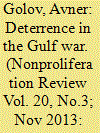

|
|
|
|
|
| Publication |
2013.
|
| Summary/Abstract |
A recently published collection of captured Iraqi records offers an opportunity to better understand Saddam Hussein's perception of US and Israeli deterrence signals, affording innovative insights into the reasons behind Iraq's restraint from using weapons of mass destruction against Israeli targets during the 1991 Gulf War. This article tests a wide range of suggested hypotheses, and suggests that US and Israeli deterrence played only a minimal role in dissuading Iraqi use of WMD. The article concludes with some thoughts on the practical implications, particularly on the effectiveness of a "no-first-use" nuclear policy.
|
|
|
|
|
|
|
|
|
|
|
|
|
|
|
|
| 2 |
ID:
102388
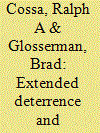

|
|
|
|
|
| Publication |
2011.
|
| Summary/Abstract |
Members of the Japanese government and the Japanese security elite welcomed the 2010 US Nuclear Posture Review (NPR) Report, praising its emphasis on the twin goals of pursuing disarmament and protecting international peace and stability. Unlike many non-nuclear weapon states, Japan does not condition its support for nonproliferation upon nuclear weapon states' progress on denuclearization. Despite general enthusiasm for the review in Japan, concerns remain. The NPR emphasizes the threat posed by nuclear weapons in the hands of non-state actors; from Japan's vantage point, state actors-North Korea, China, and Russia-are just as worrisome. While disarmament advocates in Japan had hoped the NPR would endorse a no-first-use doctrine or "sole purpose" declaration, defense officials and strategists were relieved it did not go that far, fearing that to do so would undermine US extended deterrence and leave Japan vulnerable to attack by North Korean biological or chemical weapons. US policy toward China shadows many Japanese concerns about security policy in general and nuclear policy in particular. In the absence of more clarity on the Sino-US relationship, Japanese concerns can be expected to increase. Nonetheless, the Japanese government has responded positively to the release of the NPR, in large part due to unprecedented levels of coordination and consultation between Tokyo and Washington during the drafting process. Tokyo now seeks continued close consultation on nuclear strategy and policy to develop a better understanding of the concept of extended deterrence and what Tokyo can do to support this shared goal.
|
|
|
|
|
|
|
|
|
|
|
|
|
|
|
|
| 3 |
ID:
171171
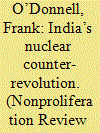

|
|
|
|
|
| Summary/Abstract |
The India–Pakistan near war of February–March 2019 highlights India’s ongoing evolution in strategic thought and practice since its emergence in 1998 as an overt nuclear-weapon possessor. These changes, involving an increasing willingness to engage in the intentional escalation of conflict with a nuclear-armed rival willing to be the first to use nuclear weapons, challenge certain academic assumptions about the behavior of nuclear-weapon states. In particular, they undermine the expectations of the nuclear-revolution theory—which anticipates nuclear and conventional restraint among nuclear-armed rivals through fear of mutual assured destruction—and the model of nuclear learning which underpins this theory, in which new nuclear-weapon states gradually absorb this restraint through policy-maker learning. This article explores how India’s learning pathway since 1998 has deviated from these expectations. India is instead pursuing its own “revolution,” in the direction of creating capabilities for flexible response and escalation dominance. It concludes by illuminating the similarities between Indian strategic behavior and contemporary practices of other nuclear-armed states, and suggests that New Delhi’s emerging de facto nuclear doctrine and posture is part of a broader empirical challenge to our current conceptions of the nuclear revolution and of nuclear learning.
|
|
|
|
|
|
|
|
|
|
|
|
|
|
|
|
| 4 |
ID:
128017
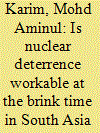

|
|
|
|
|
| Publication |
2014.
|
| Summary/Abstract |
The aim of this paper is to analyze the likely reactions of the nuclear actors, mainly
in South Asia, in any prospective tensed scenario. Nuclear deterrence is generally
being sustained in South Asia since 1971 but a turn of events might suddenly
transform this state to a degree that could prompt the decision-makers to take
hasty and irrational decisions. This paper examines the doctrines, command and
control, safety measures, nuclear terrorism, and above all the strategic stability in
South Asia in order to determine the probability of reaching the brink time. The
paper concludes that even a small-group provocative act may initiate a conventional
showdown to start with, maybe centering on Kashmir or other sensitive issues; it
may then possibly compel the actors to consider the use of nukes.
|
|
|
|
|
|
|
|
|
|
|
|
|
|
|
|
| 5 |
ID:
102384
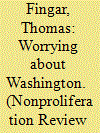

|
|
|
|
|
| Publication |
2011.
|
| Summary/Abstract |
Chinese commentators assessing the 2010 US Nuclear Posture Review (NPR) acknowledged a number of ways in which they felt it was "better" than the 2001 NPR but still found much to criticize and many reasons for concern regarding the review's implications for China and for strategic stability. They welcomed the reduction of US nuclear inventories and reliance on nuclear weapons, the commitments to seek ratification of the Comprehensive Nuclear-Test-Ban Treaty and to not conduct nuclear tests, the declaration that the United States would continue to reduce the role of nuclear weapons in deterring non-nuclear attacks, and a number of other points. Commentators generally devoted more attention to issues that were seen to have negative implications for China's deterrent (e.g., continued development of missile defense capabilities and advanced conventional weapons). Their assessments of the NPR were initially colored by the downturn in Sino-US relations in the months prior to the review's release but became more positive as the overall bilateral relationship improved.
|
|
|
|
|
|
|
|
|
|
|
|
|
|
|
|